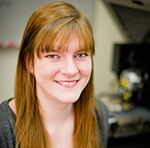Kristin Kovach
 Imagine microbubbles that could break up blood clots, deliver drugs to cancer tumors
and help the body absorb medicine. Honors physics major/math minor Kristin Kovach
is working with physics professor Gregory Salamo and University of Arkansas Medical School biophysicist Dr. Michael Borrelli to make
this promising new technology possible. The microbubbles are made from serum albumin
and dextrose and are so small that millions of them look like milky fog in a syringe.
Once the bubbles are injected into the bloodstream, ultrasound is applied to help
them do their work. That’s where Kristin comes in.
Imagine microbubbles that could break up blood clots, deliver drugs to cancer tumors
and help the body absorb medicine. Honors physics major/math minor Kristin Kovach
is working with physics professor Gregory Salamo and University of Arkansas Medical School biophysicist Dr. Michael Borrelli to make
this promising new technology possible. The microbubbles are made from serum albumin
and dextrose and are so small that millions of them look like milky fog in a syringe.
Once the bubbles are injected into the bloodstream, ultrasound is applied to help
them do their work. That’s where Kristin comes in.
“My job is to determine how a microbubble reacts to pressure – how much force it can take until it pops, and how it deforms when pressed,” she said. Kristin uses an atomic force microscope to explore the mechanical properties of the bubbles. It’s exacting work that requires a steady hand on the tweezers and a great deal of patience.
“I had to learn to do my own thing – that was hard at first,” Kristin said. “It’s the biggest challenge I’ve had at the university.”
Her mentor, Gregory Salamo, emphasized the value of independent research. “In the classroom, you apply what you learn; in research, you’re a detective pursuing an answer to the mystery,” he said. “When Kristin goes on to interview for grad school and other things, that attitude she has about doing things on her own, and using logic, that’s very powerful. They will know, this student can do that.”
Kristin received an EPSCoR Fellowship Grant in support of her research, and participated in a National Science Foundation Research Experience for Undergraduates at the University of Illinois in Urbana-Champaign last summer. Her Bodenhamer Fellowship supported a summer of study in Greece and Turkey.
Kristin is currently applying to graduate programs in physics. After she earns her doctoral degree, she’d like to help shape public policy related to the sciences.
“I’m interested in making science education in America better, because it’s really important, and I feel we’re falling behind,” she said.